Thiemo Wambsganss
A Design Space for Intelligent and Interactive Writing Assistants
Mar 26, 2024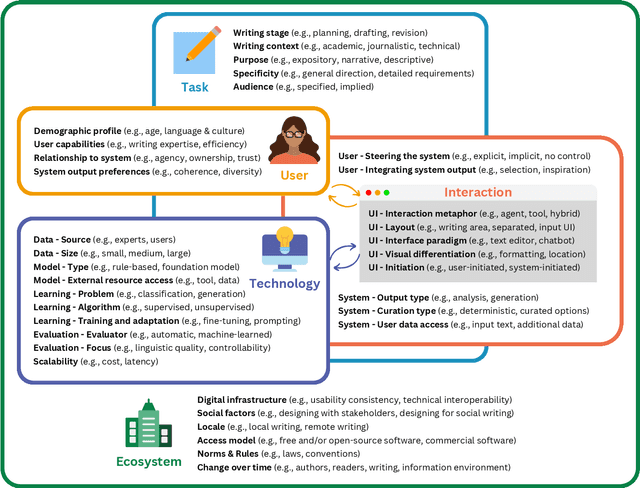
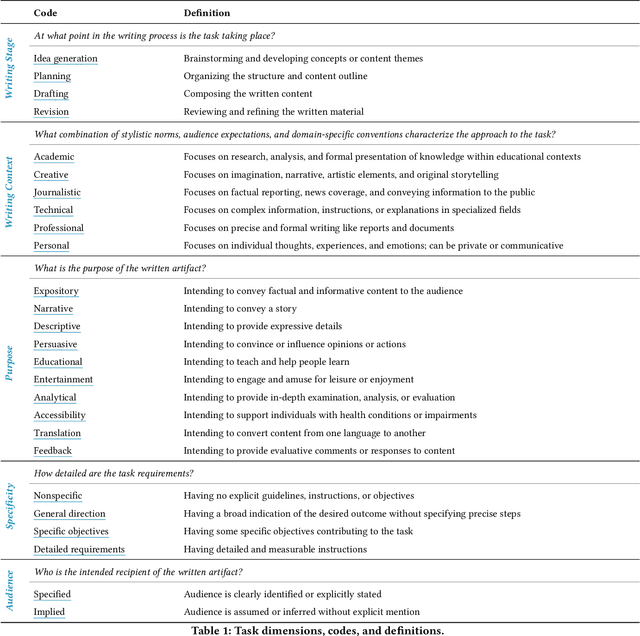
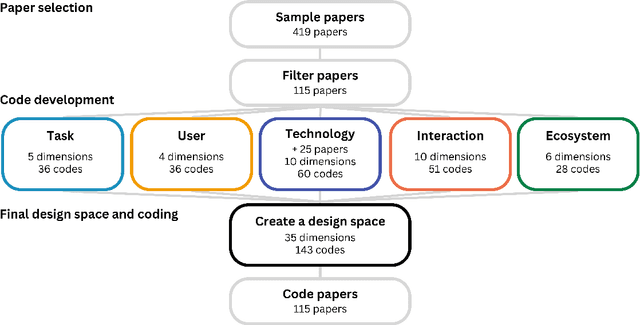
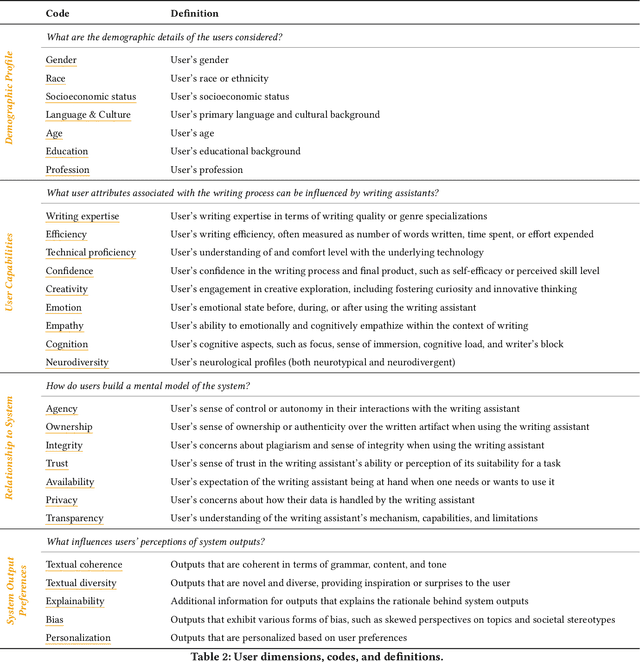
Abstract:In our era of rapid technological advancement, the research landscape for writing assistants has become increasingly fragmented across various research communities. We seek to address this challenge by proposing a design space as a structured way to examine and explore the multidimensional space of intelligent and interactive writing assistants. Through a large community collaboration, we explore five aspects of writing assistants: task, user, technology, interaction, and ecosystem. Within each aspect, we define dimensions (i.e., fundamental components of an aspect) and codes (i.e., potential options for each dimension) by systematically reviewing 115 papers. Our design space aims to offer researchers and designers a practical tool to navigate, comprehend, and compare the various possibilities of writing assistants, and aid in the envisioning and design of new writing assistants.
Unraveling Downstream Gender Bias from Large Language Models: A Study on AI Educational Writing Assistance
Nov 06, 2023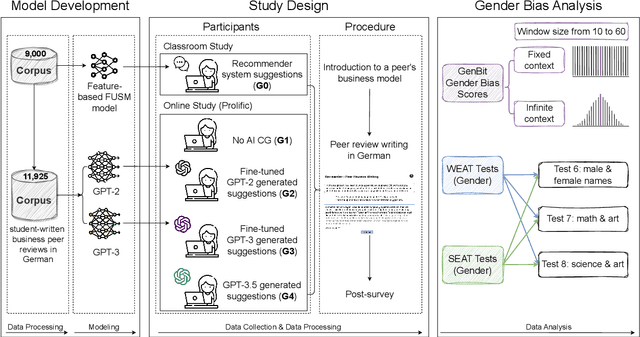

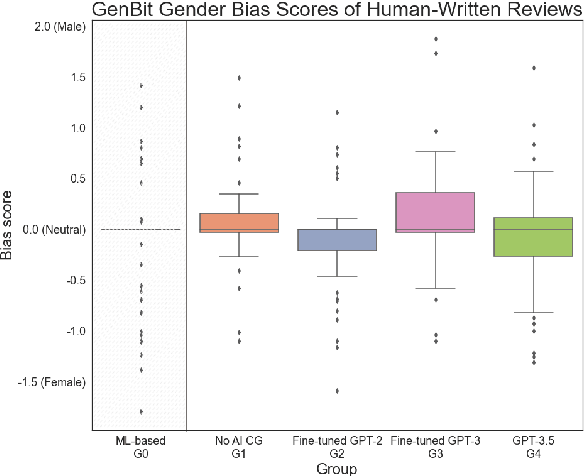
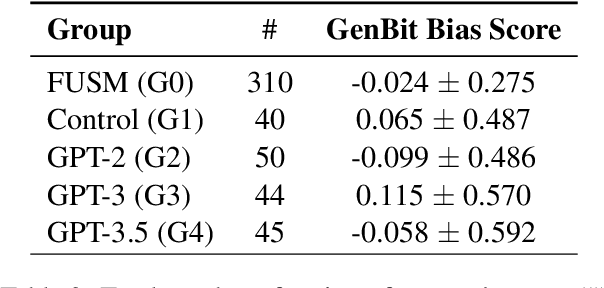
Abstract:Large Language Models (LLMs) are increasingly utilized in educational tasks such as providing writing suggestions to students. Despite their potential, LLMs are known to harbor inherent biases which may negatively impact learners. Previous studies have investigated bias in models and data representations separately, neglecting the potential impact of LLM bias on human writing. In this paper, we investigate how bias transfers through an AI writing support pipeline. We conduct a large-scale user study with 231 students writing business case peer reviews in German. Students are divided into five groups with different levels of writing support: one classroom group with feature-based suggestions and four groups recruited from Prolific -- a control group with no assistance, two groups with suggestions from fine-tuned GPT-2 and GPT-3 models, and one group with suggestions from pre-trained GPT-3.5. Using GenBit gender bias analysis, Word Embedding Association Tests (WEAT), and Sentence Embedding Association Test (SEAT) we evaluate the gender bias at various stages of the pipeline: in model embeddings, in suggestions generated by the models, and in reviews written by students. Our results demonstrate that there is no significant difference in gender bias between the resulting peer reviews of groups with and without LLM suggestions. Our research is therefore optimistic about the use of AI writing support in the classroom, showcasing a context where bias in LLMs does not transfer to students' responses.
Understanding Revision Behavior in Adaptive Writing Support Systems for Education
Jun 17, 2023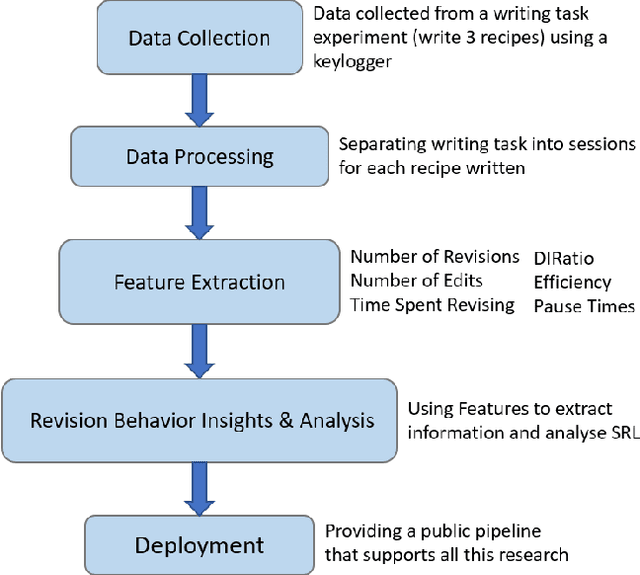

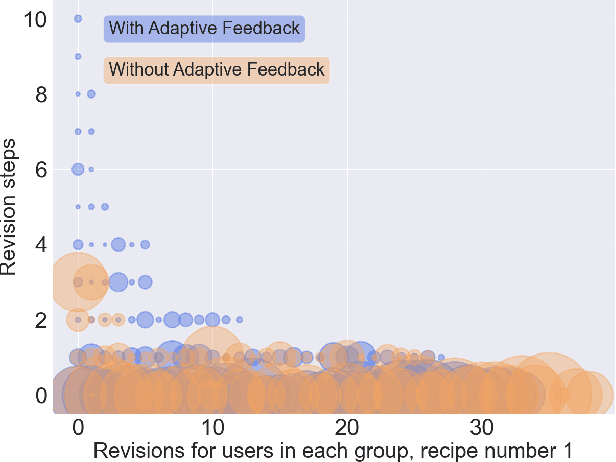

Abstract:Revision behavior in adaptive writing support systems is an important and relatively new area of research that can improve the design and effectiveness of these tools, and promote students' self-regulated learning (SRL). Understanding how these tools are used is key to improving them to better support learners in their writing and learning processes. In this paper, we present a novel pipeline with insights into the revision behavior of students at scale. We leverage a data set of two groups using an adaptive writing support tool in an educational setting. With our novel pipeline, we show that the tool was effective in promoting revision among the learners. Depending on the writing feedback, we were able to analyze different strategies of learners when revising their texts, we found that users of the exemplary case improved over time and that females tend to be more efficient. Our research contributes a pipeline for measuring SRL behaviors at scale in writing tasks (i.e., engagement or revision behavior) and informs the design of future adaptive writing support systems for education, with the goal of enhancing their effectiveness in supporting student writing. The source code is available at https://github.com/lucamouchel/Understanding-Revision-Behavior.
Bias at a Second Glance: A Deep Dive into Bias for German Educational Peer-Review Data Modeling
Sep 22, 2022



Abstract:Natural Language Processing (NLP) has become increasingly utilized to provide adaptivity in educational applications. However, recent research has highlighted a variety of biases in pre-trained language models. While existing studies investigate bias in different domains, they are limited in addressing fine-grained analysis on educational and multilingual corpora. In this work, we analyze bias across text and through multiple architectures on a corpus of 9,165 German peer-reviews collected from university students over five years. Notably, our corpus includes labels such as helpfulness, quality, and critical aspect ratings from the peer-review recipient as well as demographic attributes. We conduct a Word Embedding Association Test (WEAT) analysis on (1) our collected corpus in connection with the clustered labels, (2) the most common pre-trained German language models (T5, BERT, and GPT-2) and GloVe embeddings, and (3) the language models after fine-tuning on our collected data-set. In contrast to our initial expectations, we found that our collected corpus does not reveal many biases in the co-occurrence analysis or in the GloVe embeddings. However, the pre-trained German language models find substantial conceptual, racial, and gender bias and have significant changes in bias across conceptual and racial axes during fine-tuning on the peer-review data. With our research, we aim to contribute to the fourth UN sustainability goal (quality education) with a novel dataset, an understanding of biases in natural language education data, and the potential harms of not counteracting biases in language models for educational tasks.
Supporting Cognitive and Emotional Empathic Writing of Students
May 31, 2021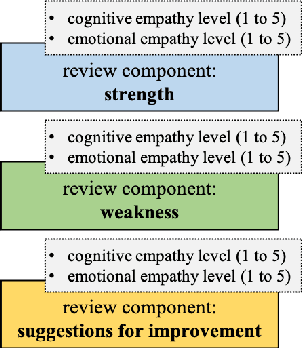
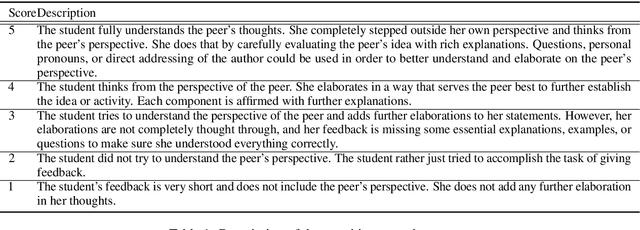
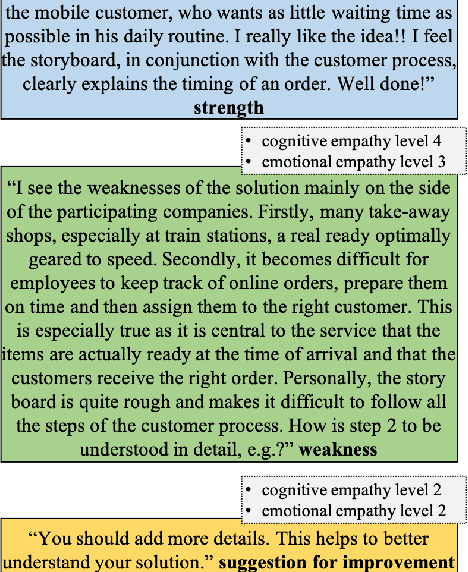

Abstract:We present an annotation approach to capturing emotional and cognitive empathy in student-written peer reviews on business models in German. We propose an annotation scheme that allows us to model emotional and cognitive empathy scores based on three types of review components. Also, we conducted an annotation study with three annotators based on 92 student essays to evaluate our annotation scheme. The obtained inter-rater agreement of {\alpha}=0.79 for the components and the multi-{\pi}=0.41 for the empathy scores indicate that the proposed annotation scheme successfully guides annotators to a substantial to moderate agreement. Moreover, we trained predictive models to detect the annotated empathy structures and embedded them in an adaptive writing support system for students to receive individual empathy feedback independent of an instructor, time, and location. We evaluated our tool in a peer learning exercise with 58 students and found promising results for perceived empathy skill learning, perceived feedback accuracy, and intention to use. Finally, we present our freely available corpus of 500 empathy-annotated, student-written peer reviews on business models and our annotation guidelines to encourage future research on the design and development of empathy support systems.
A Corpus for Argumentative Writing Support in German
Oct 26, 2020



Abstract:In this paper, we present a novel annotation approach to capture claims and premises of arguments and their relations in student-written persuasive peer reviews on business models in German language. We propose an annotation scheme based on annotation guidelines that allows to model claims and premises as well as support and attack relations for capturing the structure of argumentative discourse in student-written peer reviews. We conduct an annotation study with three annotators on 50 persuasive essays to evaluate our annotation scheme. The obtained inter-rater agreement of $\alpha=0.57$ for argument components and $\alpha=0.49$ for argumentative relations indicates that the proposed annotation scheme successfully guides annotators to moderate agreement. Finally, we present our freely available corpus of 1,000 persuasive student-written peer reviews on business models and our annotation guidelines to encourage future research on the design and development of argumentative writing support systems for students.
 Add to Chrome
Add to Chrome Add to Firefox
Add to Firefox Add to Edge
Add to Edge